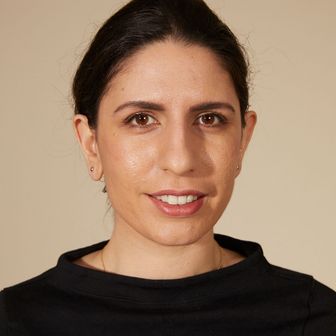
In between shoots on the HBO series’ sixth and final season, the people who put words in Hannah and friends’ mouths gathered to reflect on going deeper than punch lines.
Sarah Heyward
There’s a scene in season one: Shoshanna was supposed to be asking Ray to take her virginity. It was the first scene I ever wrote for Girls, and after Jenni read my first draft, she said, “Great. Now can you rewrite it without ever mentioning sex?” My mind was blown.
Yassir Lester
I came from stand-up. The stuff I’d written was very formulaic in its structure — it’d be like someone buying a piece of bread and someone else going, “You’re toast!” But Girls is about taking chances. Like, in the season-three finale, where Laird is rambling for a minute and a half, and then Adam just goes, “Shut the fuck up.” I paused because I was crying so hard. I was laughing so hard. The idea that someone would be crazy enough to film that and then put it in the show was so amazing.
Jason Kim
A lot of people perceive comedy writing as, what’s the funniest joke? Or what’s the funniest punch line? Judd is a person in the room who’s always asking, how can we make this more true to life? How can we make this more uncomfortable? One scene I’m proud of was when Elijah goes to Dill and pitches becoming his boyfriend. It’s a breakup scene, and to find the humor in a breakup was a challenge. I used what I learned in the room to figure out, what’s funny about this?
Tami Sagher
I didn’t come on as a writer until last year, but when I was watching a sex scene with Lena and Adam, I remember thinking, Oh, I can write that? I’m scared of even writing that in my journal.
Judd Apatow
The most difficult thing is learning how to work with other people. When we were working on the pilot, we had the table read, and then just me, Jenni, and Lena sat in a room. Maybe our only important note was, we think this show could be a little funnier than Tiny Furniture. We can go for the comedy a little bit more than you did in the movie, so let’s punch up the script. It made Lena really nervous, in writing with other people. I said, “Why don’t you just try tonight?” And then she had fun. She took that and turned it into this larger collaboration.
Lena Dunham
I used to believe jokes were somehow pandering, but Judd and Jenni helped me realize comedy is a universal language. There’s a reason we giggle at inappropriate times, use humor to survive, and there’s no shame in just making a fucking joke and seeing if it works.
Murray Miller
The first ten years I spent writing for TV, I followed a typical two- or three-act structure. It was remarkable to get on Girls and remember, “Oh, there are no rules for writing.” Just like there’s no rules for life. Other than laws.
Jenni Konner
The scene where I grew most as a writer was the entire plotline where Hannah’s dad comes out — the dinner party where their marriage falls apart. I had to tap into a different part of my brain that wasn’t trying to be seen as a 20-something, but was trying to disappear, to forget, to just be erased by time. It’s weirdly personal despite being totally outside my experience.
Max Brockman
I was 23 when I started [on Girls], and I wasn’t a writer on the show. I was an assistant. This seems obvious to me now, but I was so young that I don’t think I quite understood it then: The notion that the funniest idea is always the one that is the truest to the characters you’ve created.
Bruce Eric Kaplan
My favorite scenes have been ones where the characters were aching to express themselves: the Hannah-Marnie fight from the first season, the Jessa-Katherine scene from the same episode. The thing I am aware of constantly learning and relearning is getting out of the way of the characters.
*A version of this article appears in the June 13, 2016 issue of New York Magazine.



